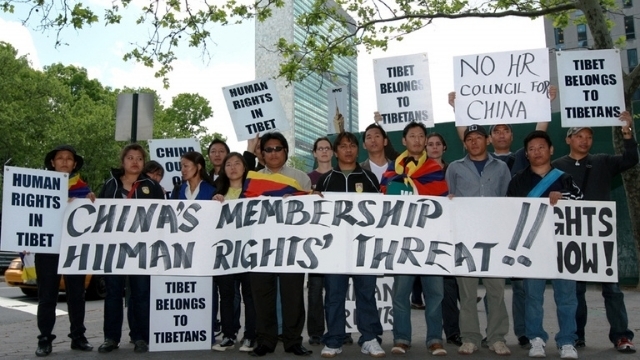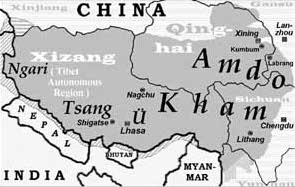First, the ChiComs stole the country, now they're stealing its name.
From Bitter Winter
By Lopsang Gurung
The first act of the new CCP boss in Tibet is to implement plans to refer to the region in English with a different denomination.

On October 20, the readers of English-language Chinese propaganda mouthpiece Global Times could read the following news item: “Chinese officials spoke highly of the rapid development and prosperity of… Xizang Autonomous Region under the successful governance of the Communist Party of China over the past 70 years, .. welcoming people from different countries to visit, as long as they hold unbiased views.” Western readers may be forgiven if they at first believed that “Xizang” was a typo for “Xinjiang,” a region where in fact visitors with “biased views” are not admitted.
But in fact the only connection with Xinjiang was that the event the Global Times was referring to was held in Beijing to introduce to foreign diplomats (although the only ambassadors mentioned as attending were the Russian and the Nepalese) the new Chinese Communist Party (CCP) secretary of Tibet, Wang Junzheng. He was previously one of the top-ranking CCP bureaucrats in Xinjiang, and was nicknamed “the butcher of Xinjiang” for the violent repression of the Uyghurs and other Muslim peoples there.
As soon as he was appointed, Wang rushed to implement a directive coming from last August’s Tibet Work Conference and reiterated by the “Publicity Department” (the former “Propaganda Department”) of the CCP. From now on, the name “Tibet” in English and other Western languages translations of official documents should be gradually replaced by “Xizang.”
There is still some confusion within the CCP itself. The Global Times in the article consistently used “Xizang” and mentioned “Tibet” only in connection with propaganda by the West and the “Dalai clique.” However, it fell near the finishing line when it mentioned “the GDP in Tibet.” And on the same October 20, Foreign Minister Wang Yi kept using “Tibet.” However, CCP’s directives are always implemented, and we may expect that “Tibet” will be eventually replaced by “Xizang” in all Western-language Chinese documents.
The CCP’s fellow travelers and Internet trolls (who have also “colonized” Wikipedia pages, as Wikipedia has admitted) are promoting two basic lies for the use of “Xizang” over “Tibet.”
The first is that China is returning to the most ancient use, as “Xizang” is older than “Tibet.” This is simply not true. “Tibet” in its Turkish form “Tüpüt” is attested in Turkish language since the 8th century CE, and in the following centuries variants of “Tubbat” were used in Arabic and Persian. Italian traveler Marco Polo, who visited the area in the 13th century, in Book 2, Chapter 45, of “The Travels of Marco Polo” (originally titled in Italian “Il Milione”) used “Tebet.” In the same century, Papal legate to the Mongol court, Giovanni da Pian del Carpine, used the spelling “Thabet.” As opposite to this, “Xizang” was first used by the Qing in the 18th century. It is thus clear that the name “Tibet” predates “Xizang” by some 1,000 years.
The second lie is that changing “Tibet” to “Xizang” is needed because the word “Tibet” is confusing. The ethnic and cultural Tibet also includes the regions traditionally called Amdo and Kham, today divided between the Chinese provinces of Qinghai, Gansu, Sichuan, and Yunnan. The Tibet Autonomous Region (TAR) only includes half of historical or ethnic Tibet. So, it is argued, in order to avoid confusions, it would be appropriate to use “Tibet” for the larger area where Tibetan culture prevails, and “Xizang” for what China has until now called TAR. Note that this argument is never used in China, and reserved for use of some CCP fellow travelers abroad. The CCP itself would never admit that Amdo and Kham are part of Tibet. If it would decide to do so, it may simply use “West Tibet” for the TAR, rather than “Xizang,” which means “West” (Xi, 西) “Zang.”
But where exactly does the name “Xizang” come from? Even before the last announcements, there was a debate on social media and elsewhere. Some Tibetans and free Tibet supporters claim that “Xizang” means “Western storage,” which is colonialist and offensive, making Tibet a place of storage or a repository of precious goods to be exploited by China. Supporters of the CCP counter that “Zang” (藏) in “Xizang” (西藏) may also be a storage place in the sense of a “treasure vault” and has been used for Buddhist canons, also called “treasures.” The meaning of “the Western Buddhist treasure [land]” would not be offensive.
With all due respect, cultivated Tibetans would answer that both positions are wrong. When the Qing created “Xizang” they added the geographic “Xi” (West) to the Tibetan “Gtsang,” which they transcribed as “Zang.” What did “Gtsang” (sometimes transliterated by Westerners as “Tsang”) mean? It was the name of one of the historical regions constituting Tibet, its central-western part, bordering a region called Ü (Dbus, in the Wylie transliteration), with Amdo and Kham on its East. Religiously, Ü, or Dbus, where Lhasa is, was controlled by the Gelug lineage of Tibetan Buddhism, and Gtsang by the Sakya lineage. With the prevalence of the Gelug (the Dalai Lamas’) lineage, the two regions of Dbus (Ü) and Gtsang became one (incorporating also the remote westernmost region of Ngari) through a process completed in the 17th century, forming the region of Ü-Gtsang or Dbus-Gtsang, a name which Chinese travelers of the Ming period transliterated as Wusi-Zang (烏斯藏).

Not for the first nor for the last time in history, the Qing took the name of a part of a country and used it for the country as a whole, calling Tibet “Xizang,” i.e., “Western” (Xi) Gtsang (Ch. Zang), where “Western” did not indicate that there was an “Eastern Gtsang” somewhere but that the region as a whole lied in the West of the Chinese Empire.
The memory of the fact that “Gtsang” (Ch. Zang) was once a semi-independent region was never lost. Since the area called Gtsang before the merger with Ü that created Ü-Gtsang is where the seat of the Panchen Lama at the Tashi Lhunpo monastery is located, in the 1950s the 10th Panchen Lama, at the time a supporter of China, toyed with the idea of restoring an autonomous Gtsang that he would have ruled. The Chinese were not interested.
We may add that until the Chinese nationalists and later the CCP started promoting “Xizang” as a Chinese name indicating that Tibet was part of China, “Xizang” was never the most popular Chinese-language name for Tibet. “Tufan” (吐蕃) remained more widely used until the 20th century and even afterwards. According to modern scholars, “Tufan” came for the clan name of an aristocratic family, Tufa (禿髮). In fact, when mentioned at all, today 吐蕃 is spelled “Tubo” rather than “Tufan” by official Chinese scholars. Ironically, “Tubo” sounds a little bit like “Tibet,” but that 蕃 cannot be read as “Bo” was conclusively established by French Sinologist Paul Pelliot in 1915. Those, including the CCP scholars, who claim that 吐蕃 should be read as “tubo” use this as an argument proving that the Tang emperors incorporated in their language and culture the Tibetan name for Tibet, “Bod,” just as they allegedly incorporated into their empire Tibet itself.
Of course, this is similar to the linguistic colonial operation that led to call East Turkestan, or whatever other name was used by the non-Han inhabitants of the region, “Xinjiang” (New Borderland), a denomination first used by the Qing just as they used “Xizang” for Tibet. In this sense, Wang Junzheng is uniquely qualified to impose to the Tibetans the new name of their land.
Tibetans and several Tibetologists have suggested that, rather than changing “Tibet” into “Xizang” in English, the CCP should change “Xizang” into “Tibet” in Chinese. The phonetical form to be used for “Tibet” exists in Chinese, 圖伯特 (phonetically, “Tu-bo-te”), it has been adopted by serious scholars writing in Chinese, and is attested in China since at least the 18th century.
Rather than stealing from Tibetans even the name of their country, the Chinese should set the record straight, and acknowledge that the name of that land is Tibet.
No comments:
Post a Comment
Comments are subject to deletion if they are not germane. I have no problem with a bit of colourful language, but blasphemy or depraved profanity will not be allowed. Attacks on the Catholic Faith will not be tolerated. Comments will be deleted that are republican (Yanks! Note the lower case 'r'!), attacks on the legitimacy of Pope Leo XIV as the Vicar of Christ, the legitimacy of the House of Windsor or of the claims of the Elder Line of the House of France, or attacks on the legitimacy of any of the currently ruling Houses of Europe.